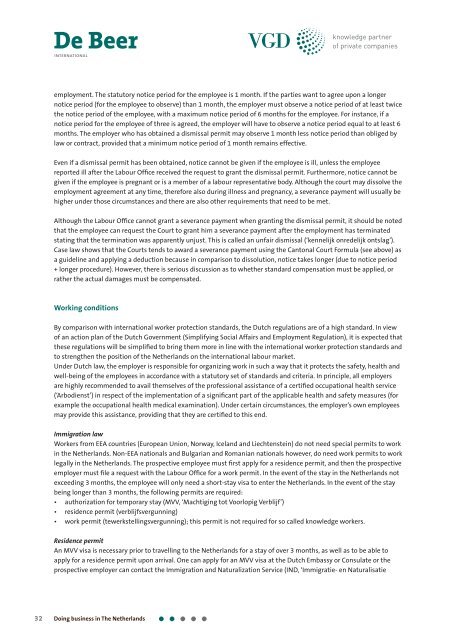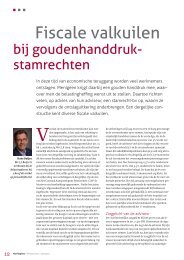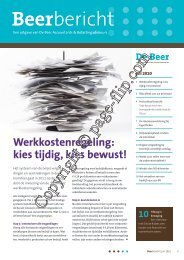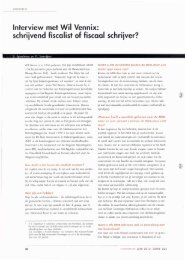De Beer
De Beer
De Beer
- No tags were found...
Create successful ePaper yourself
Turn your PDF publications into a flip-book with our unique Google optimized e-Paper software.
<strong>De</strong> <strong>Beer</strong>INTERNATIONALknowledge partnerof private companiesemployment. The statutory notice period for the employee is 1 month. If the parties want to agree upon a longernotice period (for the employee to observe) than 1 month, the employer must observe a notice period of at least twicethe notice period of the employee, with a maximum notice period of 6 months for the employee. For instance, if anotice period for the employee of three is agreed, the employer will have to observe a notice period equal to at least 6months. The employer who has obtained a dismissal permit may observe 1 month less notice period than obliged bylaw or contract, provided that a minimum notice period of 1 month remains effective.Even if a dismissal permit has been obtained, notice cannot be given if the employee is ill, unless the employeereported ill after the Labour Office received the request to grant the dismissal permit. Furthermore, notice cannot begiven if the employee is pregnant or is a member of a labour representative body. Although the court may dissolve theemployment agreement at any time, therefore also during illness and pregnancy, a severance payment will usually behigher under those circumstances and there are also other requirements that need to be met.Although the Labour Office cannot grant a severance payment when granting the dismissal permit, it should be notedthat the employee can request the Court to grant him a severance payment after the employment has terminatedstating that the termination was apparently unjust. This is called an unfair dismissal (‘kennelijk onredelijk ontslag’).Case law shows that the Courts tends to award a severance payment using the Cantonal Court Formula (see above) asa guideline and applying a deduction because in comparison to dissolution, notice takes longer (due to notice period+ longer procedure). However, there is serious discussion as to whether standard compensation must be applied, orrather the actual damages must be compensated.Working conditionsBy comparison with international worker protection standards, the Dutch regulations are of a high standard. In viewof an action plan of the Dutch Government (Simplifying Social Affairs and Employment Regulation), it is expected thatthese regulations will be simplified to bring them more in line with the international worker protection standards andto strengthen the position of the Netherlands on the international labour market.Under Dutch law, the employer is responsible for organizing work in such a way that it protects the safety, health andwell-being of the employees in accordance with a statutory set of standards and criteria. In principle, all employersare highly recommended to avail themselves of the professional assistance of a certified occupational health service(‘Arbodienst’) in respect of the implementation of a significant part of the applicable health and safety measures (forexample the occupational health medical examination). Under certain circumstances, the employer’s own employeesmay provide this assistance, providing that they are certified to this end.Immigration lawWorkers from EEA countries (European Union, Norway, Iceland and Liechtenstein) do not need special permits to workin the Netherlands. Non-EEA nationals and Bulgarian and Romanian nationals however, do need work permits to worklegally in the Netherlands. The prospective employee must first apply for a residence permit, and then the prospectiveemployer must file a request with the Labour Office for a work permit. In the event of the stay in the Netherlands notexceeding 3 months, the employee will only need a short-stay visa to enter the Netherlands. In the event of the staybeing longer than 3 months, the following permits are required:• authorization for temporary stay (MVV, ‘Machtiging tot Voorlopig Verblijf’)• residence permit (verblijfsvergunning)• work permit (tewerkstellingsvergunning); this permit is not required for so called knowledge workers.Residence permitAn MVV visa is necessary prior to travelling to the Netherlands for a stay of over 3 months, as well as to be able toapply for a residence permit upon arrival. One can apply for an MVV visa at the Dutch Embassy or Consulate or theprospective employer can contact the Immigration and Naturalization Service (IND, ‘Immigratie- en Naturalisatie32 Doing business in The Netherlands







